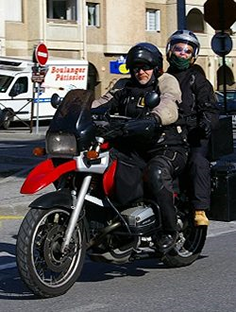 Now in the public domain is information about the political moves of the European Commission’s proposal for mandatory Road Worthiness Testing (RWT) which was launched in September at a meeting of the Transport and Tourism (TRAN) of the European Parliament.
Now in the public domain is information about the political moves of the European Commission’s proposal for mandatory Road Worthiness Testing (RWT) which was launched in September at a meeting of the Transport and Tourism (TRAN) of the European Parliament.
The TRAN Committee will be the responsible committee of MEPS to look at, submit proposals for changes to the RWT proposal itself and eventually submit a final draft document to the European Parliament for agreement.
That is the simplified version and if you have been following the Regulation proposal on type approval etc you will know that there is a ”complicated” line of decision making and compromises in committees and council before any agreement can have a final vote in the EU Parliament.
At Right To Ride we have just begun to make initial forays to contact “players” involved for discussions, we wait for the announcement of the Rapporteur and Shadow Rapporteurs, MEPs in charge of the proposal file to make contact with them.
Some riders and their organisations have already held demos mainly in Brussels and FEMA (the Federation of European Motorcyclists Associations) handed a petition to the European Commission when there was a consultation, before the proposal was announced, to voice their opposition to the impending proposal.
As we already have RWT(MoT) here in Northern Ireland and the rest of the UK (albeit a slightly different system), our main concern is that there does not appear to be what is already being hailed as a “Super MOT” arriving on our shores.
A first glance at the proposals suggests that this does not seem to be the case.
Even if emissions testing is introduced for motorcycles, this is a long way down the road and would not necessarily put the cost of an MoT up to an unsustainable price (which is being suggested) and would be welcome so that we can “prove” that our bikes are as green as we say they are and sustain that “greenability” during their use and life time.
TRAN Committee
So what was discussed at the TRAN Committee?
From the public minutes we know that there was an exchange of views with Commissioner Kallas on the Road Worthiness package and that MEPs that spoke were: Mathieu Grosch, Saïd El Khadraoui, Philippe De Backer, Michael Cramer, Jacqueline Foster, Dieter-Lebrecht Koch, Jim Higgins, Ismail Ertug, Hubert Pirker, Inés Ayala Sender, Marian-Jean Marinescu, Isabelle Durant, Brian Simpson.
These include UK MEPs , Brian Simpson (Labour) and Chair of the TRAN Committee, Jacqueline Foster (Conservative) and Jim Higgins from Ireland. The EPP Group will provide the Rapporteur, which, if this is a UK MEP they will be from the Conservative party.
From the TRAN Committee comes the latest newsletter in which there are more details on the discussions:
As we have already heard from the European Commissioner Siim Kallas, he reiterated that, “More than five lives could be saved on Europe’s roads every day with the implementation of this new legislative package.”
According to the Commission,” there are too many vehicles with technical defects on the road. Moreover, many technical defects with serious implications for safety (such as ABS and Electronic Stability Control) are not even checked under current rules.
The role of Periodic Technical Inspections (PTI) is to ensure that vehicles in operation are properly maintained and tested, so that their performance remains in accordance with the type-approval throughout their lifetime. Vehicle checks are therefore fundamental to road safety.”
Commissioner Kallas also explained, “the main points of this legislative package:
- compulsory testing for scooters and motorbikes;
- increasing the frequency of periodic tests;
- improving the quality of checks by setting common minimum standards for deficiencies, equipment and inspectors;
- mandatory testing of electronic safety components and measures clamping down on mileage fraud.
- setting up a risk-rating system aimed at focusing inspections on vehicles operated by undertaking with poor safety records, thus rewarding vehicles operated by undertakings that are focused on safety and the environment (sic).
The newsletter reports that, “Members showed their support to any legislative measure aimed at improving road safety, stressing that quality of tests was as important as their frequency.”
However, “Some expressed concern regarding the current differences among Member States in relation to technical inspections and the lack of the mutual recognition of tests.”
Importantly for the riders’ lobby and rider organisations, “Not all groups welcomed the inclusion of motorbikes and tractors in the proposal, fearing that this could lead to an increased administrative burden.”
Finishing on the issue of historic vehicles the Commissioner was reported in relation to these vehicles as saying, “That the proposal is not a threat to these kinds of vehicles as long as they use reproductions of their historic components.”
Rider Reaction
These last two comments have already created reactions as mentioned above whereby rider organisations in some EU have raised their objections to the proposal either with the view that RWT is unnecessary or that the increased frequency proposed will not improve safety.
Equally historic vehicles owners and groups that heavily modify older vehicles have concerns about the implications of the proposal in terms of what will be allowed or considered as an “historic” vehicle by the Commission.
Onward Discussion
As with other proposals from the Commission, this will be discussed by the parliamentary group (TRAN) which will undoubtedly put forward a counter-proposal with a raft of amendments. Then the various stakeholders will be given an opportunity to have their say and the document will be discussed, modified, parts will be added or deleted, other MEP Committees will give their opinion, until all three bodies – the Commission, Council and Parliament have come to an agreement.
Generally this takes about three years.
So at Right To Ride our view is that we need to look at the proposal, get talking to those involved and report the facts as they develop so that riders can make up their minds in order to debate the issues, based on the information provided.
Links
Tran Committee – Click Here
September 2012 Newsletters – Click Here
Read and Comment on Right To Ride EU – Click Here


